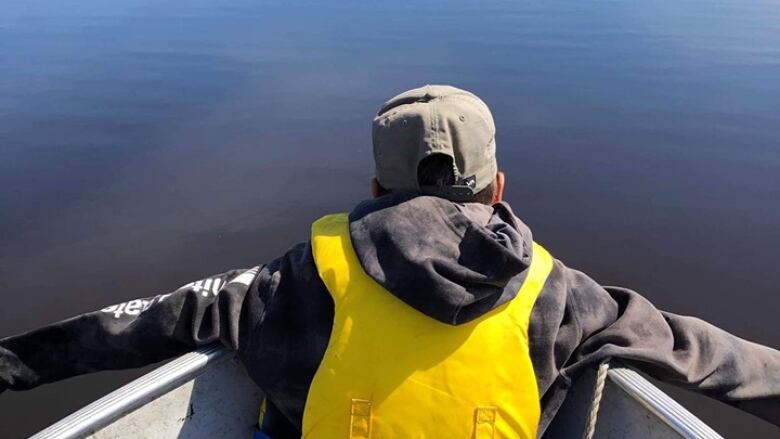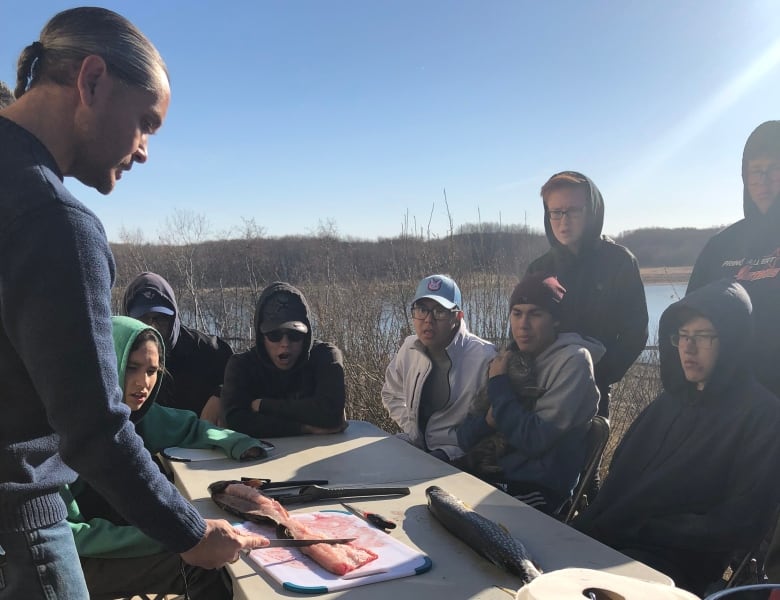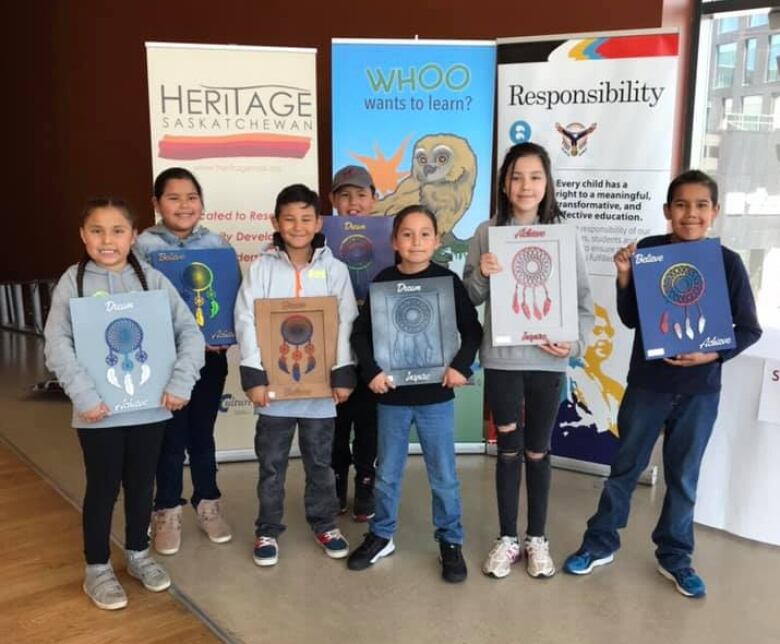Land-based education in Sask. education system not just a trend: teachers
Methods spreading to some non-Indigenous schools

Land-based education for all is a tangible form of reconciliation, according to educators who teach those kinds of programs.
The idea is to get school-aged kids on the land to learn practical skills that are also relevant to their education.
Things like picking muskeg tea leaves or skinning moose aren't out-of-place in land-based learning programs.
Listen: Land based learning as reconciliation
While it's already a popular concept in Indigenous schools around Sask., some other schools are taking on the concept.
Bert Fox Community High School in Fort Qu'Appelle, Sask., operated through the Prairie Valley School Division, offers a land-based learning program at theGrade 10 level, according to principal Julie Stiglitz. She said the learning encompasses science, wildlife management, English language arts and native studies.
Students are taught by the same teacher through the entire first semester of Grade 10.
"They've done fishing, fish filleting, ice fishing, they've done rabbit snaring, we had dog sleds in, so they led dog sleds and those kinds of things," Stiglitz said. "They do lots of project-based learning, and really have to take responsibility for their own learning in that way."
This is what reconciliation is about.- Phillip Brass
Phillip Brass teaches some of the students in the learning from the land program. He called it a work in progress in terms of marrying the teachings with the provincial curriculum.

He said that process is essentially about bending the system to work in a way that it suits the learning environment for students.
"Really, the system we have now isn't a very traditional system, it's a young, maybe 150-year old system and it's failing our children," Brass said. "We're actually reverting back to a much more traditional learning style."
He said that on the land, students retain more of what they learn.
For Brass, providing non-Indigenous students with an opportunity to participate in land-based learning is a tangible form of reconciliation.
"This is what reconciliation is about. It's about moving out of the colonial model and sharing our knowledge and culture with one another as was originally intended," Brass said. "For non-Indigenous kids, they get a real grasp of where they live."
Brass said he's seen students who participate in the program develop a better sense of belonging. He said they're also developing better bonds with instructors of the land-based programming than they do in a classroom setting.
Stiglitz said that, as a non-Indigenous person, she's learned how important the connection with the land is for Indigenous people and her students. She said about 20 of the school's 50 Grade 10 students are participating in the program.
So far, she's seen better credit attainment and attendance records from students participating in the program than those attending traditional classes.
"Students are more engaged. Students are wanting to be at school and do their best to get here when they know something important is happening," Stiglitz said.
Using land-based education to revitalize language
Karen Morin teaches both Cree and the land-based education programs at the school on Muskeg Lake Cree Nation.
"They do fit very well together," Morin told CBC Radio's Blue Sky on Wednesday. "I talk to the kids in Cree the more I talk to them like that, like conversational Cree, they get that more than just sitting in a classroom trying to learn the word."
Kirsten Catarat teaches the land-based education program at the Buffalo River School, in Dillon Sask., roughly 366 kilometres northwest of Prince Albert.

Catarat taught math and science at a high school level for five years prior to earning her master's degree in land-based education through the University of Saskatchewan.
"It got to the point where I felt I was oppressing my children rather than helping them when I taught in my hometown reserve," she said. "I needed change, like I needed something different, otherwise I was borderline about to quit the teaching career."
She said land-based education has become more than just a trend and goes beyond what outdoor education teaches. For her, it's ceremony.
Like Morin, Catarat also uses land-based education to keep the Dene language alive. She said there's a good understanding of the language but there are problems when it comes to speaking it fluently.
"Because ties have been severed from the land, we're using land-based education to replenish those connections and rebuild them with the students and the land," Catarat said.
Learning in the land still provides a classroom education
Morin said almost everything the youth are learning through land-based education has practical life applications.
For example, kids who learn how to make moose hide also learn about math and science.
"It comes with a lot of measurements, like the size of the frame, the size of the moose hide, that could easily fit into math and the scraping of the flesh, and after you scrape the flesh, you dry the hide, all that stuff would fit into science," Morin said.
"Almost everything we are doing, it fits into the core subjects."
Morin admitted that sometimes she's not even aware she's inadvertently teaching students subjects they would learn in a classroom setting. Sometimes she encourages her students to explore how what they're learning can be applied to subjects they'd learn in a classroom.

Catarat said the Buffalo River School's land-based education program operates in a similar fashion. She said the teachers just take the kids to the landand teach them.
"While they're doing it we explain how these subjects can be incorporated into it, and they're very surprised, like they start to think about it," Catarat said.
Elders included in education process
Grade 4 student Tate Arcand was inspired by his land-based education program at Muskeg Lake to seek out further knowledge outside of school.
He learned a bit about sweat lodges in the program, then went on his own to meet with and elder in Muskeg Lake to satisfy his hunger for knowledge.
That's something Morin said the elders absolutely love to see.
"Kids at that age are always asking questions, [the elders are] open, and they're willing to share [with] the kids," Morin said. "[The elders] are pushing land-based [learning] and Cree in the community and I'm fortunate enough to work for them."
Buffalo River School's education program also works to connect students with elders according to Catarat. As a way to rebuild language connections, while reconnecting students with the land, elders and community members are brought in to work with the youth.
With files from Blue Sky












_(720p).jpg)


 OFFICIAL HD MUSIC VIDEO.jpg)
.jpg)



























































































